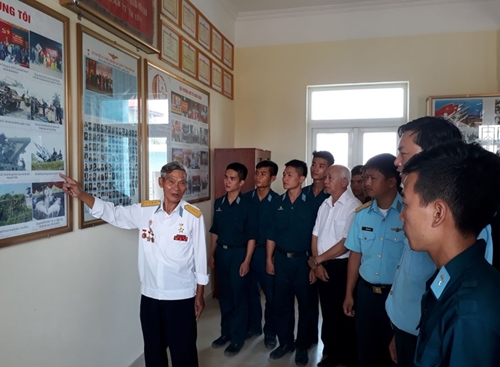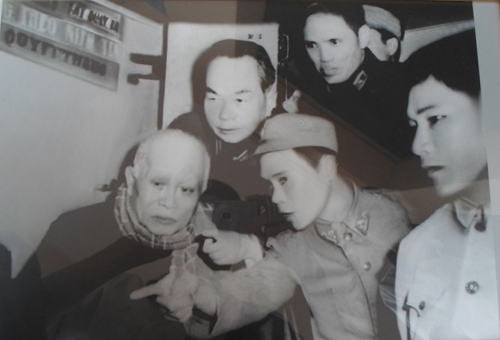Eighteen years later, as the Commanding Officer of Battalion 77, Regiment 257, Division 361, the Air Defense – Air Force Service (ADAF), he directed his troops to become one of the units to down the largest number of B-52s (four aircraft), contributing to the victory of the 12-day-and-night campaign in December, 1972.
Why were enemy aircraft downed and why not?
According to Senior Colonel Dinh The Van, knowing that the enemy would attack Hanoi, Battalion 77 was dispatched to Chem in Thuy Phuong commune, Tu Liem district (now Thuy Phuong ward, Bac Tu Liem district, Hanoi) in March 1972 to defend the city. On April 16, 1972, the U.S. hit Hai Phong and Military Region 4 by B-52s. Numerous rockets were fired by Vietnamese forces, but no B-52s had been shot down. To improve the situation, the battalion promoted training program scenarios with high determination of defeating the bombers. On visiting the unit while it was training, Political Commissar of the ADAF Comrade Dang Tinh noted that the unit should organize meeting to find out the reasons why some aircraft were shot down and some were not.
    |
 |
|
Senior Colonel Dinh The Van tells troops of Battalion 77, Regiment 257, Division 361, the Air Defense – Air Force Service about the historic traditions of the unit. |
After nearly 20 years in the military, having gone through many fierce battles, he still felt nervous. In April, 1972, missile units in Hai Phong implemented many solutions to shoot down the B-52, but in vain. By that time, no military in the world had ever defeated a B-52.
On December 18, 1972, after receiving an order from the higher level, the battalion was on standby to be ready to destroy B-52s. After having failed many times, at 4:39 on December 19, with the sound solution, the battalion shot down a B-52 in Tam Hung commune, Thanh Oai district, Ha Tay province (currently Hanoi). On December 21, the unit continued its record with two B-52s defeated in Ba Vi and Phuc Yen.
During the battle on December 21, soldier Nghiem Xuan Danh bravely laid down his life. After the loss on December 20, the U.S. Air Force changed its air raid strategy in Hanoi. They used the tactical aircraft, which was accompanied by 16 F-4 fighters, to target our missile positions. In that situation, Commanding Officer Dinh The Van was directed to save ammunition to destroy the B-52, while there were eight anti-aircraft artillery companies and two R405 platoons to protect the battlefields.
At 9:00 on December 21, 1972, the enemy’s aircraft were flying in the sky of Hanoi. Corporal Nghiem Xuan Danh detected four F-4s from 45km away. At a distance of 30km, he shouted: “The target flew straight into the battlefield!” He was tracing every step of the U.S. aircraft. As a result, the four F-4s bombed the battlefield, and comrade Nghiem Xuan Danh was killed while performing his assigned task.
“If the enemy bombs, I will protect the General”
December 22, 1972 marked the 28th founding anniversary of the Vietnam People’s Army (VPA). The entire unit, however, had to concentrate on overcoming the effects after the U.S. dropped bombs on the battlefield a day earlier, causing casualties to our troops and damaging our weapons. At that time, General Vo Nguyen Giap, the Commander-in-Chief and the big brother of the VPA, visited the unit. Senior Colonel Dinh The Van was asked on how to protect the general when the enemy attacks the battlefield. He declared, “I will protect the General if the enemy bombs.”
General Vo Nguyen Giap encouraged the troops in the battlefield and requested them to quickly repair weapons, overcome shortcomings so as to win over the enemy.
    |
 |
|
Senior Colonel Dinh The Van (center, front) with President Ton Duc Thang and General Vo Nguyen Giap in 1972 (File photo) |
The general’s timely encouragement promoted the troops’ determination to overcome all difficulties for the victory of the campaign. Therefore, on December 26 and 27, the battalion shot down one more B-52, contributing to the “Hanoi - Dien Bien Phu in the air” victory, forcing the U.S. to sit down at the negotiation table and sign the Paris Peace Accords - an agreement to end the war and restore peace in Vietnam.
As the Paris Peace Accords was signed, comrade Le Duc Tho, Special Advisor of the Government delegation, returned to Hanoi. Right after landing, he visited the unit and thanked the air defense troops and the Hanoi people for their contribution to the victory of Vietnam at the Paris Conference.
With great achievements during the Hanoi - Hai Phong campaign in December 1972, in mid-1973, Battalion 77 was conferred the title of Hero of the People’s Armed Forces by the Party and State while Commanding Officer Dinh The Van was awarded the First-class Military Exploit Order. In 2013, Senior Colonel Dinh The Van was conferred the title of Hero of the People’s Armed Forces.
Translated by Minh Anh